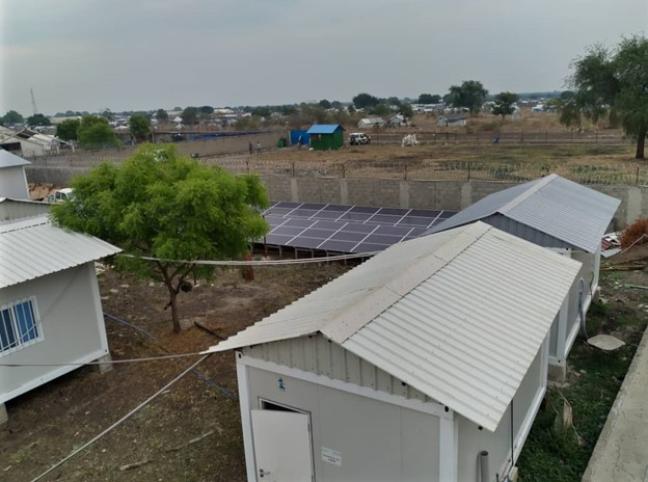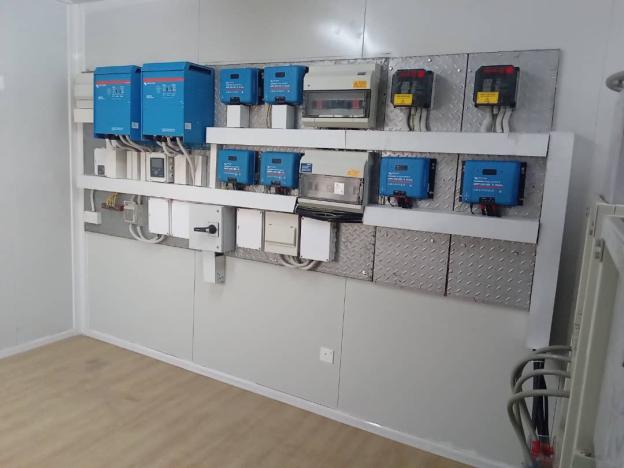-
Who We Are
WHO WE AREThe International Organization for Migration (IOM) is part of the United Nations System as the leading inter-governmental organization promoting since 1951 humane and orderly migration for the benefit of all, with 175 member states and a presence in over 100 countries. IOM has had a presence in South Sudan since 2011.
About
About
IOM Global
IOM Global
-
Our Work
Our WorkAs the leading inter-governmental organization promoting humane and orderly migration, IOM plays a key role to support the achievement of the 2030 Agenda through different areas of intervention that connect both humanitarian assistance and sustainable development. IOM South Sudan provides a comprehensive response to the humanitarian needs of migrants, internally displaced persons, returnees and host communities.
Cross-cutting (Global)
Cross-cutting (Global)
- Data and Resources
- Take Action
- 2030 Agenda
Humanitarian Hub in Pibor Goes Green
Pibor – The International Organization for Migration (IOM), with support from Danish Emergency Management Agency (DEMA) and Swedish Civil Contingencies Agency (MSB), has upgraded Pibor Humanitarian Hub with a solar power generation plant in South Sudan’s Greater Pibor Administrative Area (GPAA).
The solar setup has a capacity of 26.4 KVA and a power bank sufficient for humanitarian hub power requirements and will reduce the carbon footprint in humanitarian hub operation.
IOM constructed the Pibor hub with funding from South Sudan Humanitarian Fund (SSHF) in early 2021 as part of ongoing project on the construction of humanitarian hubs in deep field locations. The project aims to support scale up and localization of humanitarian response in remote and hard-to-reach areas, whilst, also creating enabling environment for setting up long-term, development programs.

Plan International manages Pibor hub operation which currently provides services to more than 15 organizations, five of which have permanent service provision agreements.
“IOM, along with its partners, is committed to reducing carbon print through its operation, and this is another small step towards an environment-friendly and sustainable operational approach,” said IOM Humanitarian Hubs Project Coordinator, Wasif Najib.
“This renewable energy plant contributes to UN’s SDGs by expanding availability of affordable and clean energy.”

IOM, in partnership with MSB and DEMA, has completed the construction of new humanitarian hubs in Kodok (Upper Nile State) Leer (Unity State) in 2021, and the construction of another hub in Raja (Western Bahr el Ghazal State) is ongoing. Further, IOM is managing Malakal Humanitarian Hub which is also running on solar energy.
These new humanitarian operational facilities are equipped with a solar energy generation system and designed to be environmentally friendly in day-to-day operation. Management of bookings and reservation is centralized through Global Humanitarian Hub portal, making it accessible to all partners operating in South Sudan.
Booking/reservation website can be accessed through the following links:
Kodok: https://humanitarianbooking.wfp.org/en/countries/ss/locations/1287/accommodations/1346/detail/ email: wvi-iom-hh.kodok@wvi.org
Leer: https://humanitarianbooking.wfp.org/en/countries/ss/locations/947/accommodations/1379/detail/ email: HRSS-IOM-LEER.HH@hoperestorationsouthsudan.org
Pibor: https://humanitarianbooking.wfp.org/en/countries/ss/locations/657/accommodations/1148/detail/ emil: PlanHH.Pibor@plan-international.org
For more information, please contact: Jale Richard at IOM South Sudan, Tel: +211 929003152, Email: jasantos@iom.int
